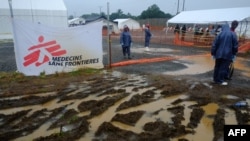The international health group Doctors Without Borders is launching clinical trials in West Africa to test the effectiveness of three potential Ebola treatments.
The group announced Thursday it hopes to begin the trials next month, with the first results available as early as February.
Doctors Without Borders is partnering with three other organizations to conduct the separate trials, two of which involve antiviral drugs.
The French National Institute of Health and Medical Research will test a drug called favipiravir at an Ebola treatment center in Guinea. The University of Oxford will test the other drug, called brincidofovir, at a site not yet determined.
In the final trial, the Antwerp Institute of Tropical Medicine will test how well Ebola patients respond when given blood or plasma that contains antibodies from people who have survived the virus. The treatment will be tested in the Guinean capital of Conakry.
The drugs were chosen on the basis of their safety, efficacy and availability.
Annick Antierens, Doctors Without Borders’ head of experimental Ebola products, said a number of promising drugs were not considered for these clinical trials because they weren't available to give patients after previous trials ended.
She told VOA this is a therapeutic trial, so every confirmed Ebola patient will be given the opportunity to engage in the trial. Patients will be informed of potential risks and must consent to the therapy.
"There will be a very impressive informed consent," Antierens said.
Peter Horby, chief investigator for the Oxford-led drug trial, said the only way to know whether available drugs work on Ebola patients is to test them during an epidemic.
"If we are going to find a treatment, we have to do it now, which is why we have to accelerate these trials," Horby said. "It is very challenging. We are going fast by clinical trial standards – maybe not fast enough for the people on the ground. I think these trials are not a moment too soon."
If a drug does nothing to reduce the fatality rate of Ebola patients, now at about 50 percent, the trial will stop and will continue with another drug, the aid group said.
Doctors Without Borders is urging drug manufacturers to ramp up their supplies even before the trials end so that any treatments found to be effective can be applied without a delay.
The worst-ever outbreak of Ebola began in Guinea late last year before spreading to other countries, mainly neighboring Liberia and Sierra Leone.
The outbreak has infected more than 14,000 people, with 5,160 reported deaths, the World Health Organization reported Wednesday.
VOA's Lisa Schlein contributed to this report.





